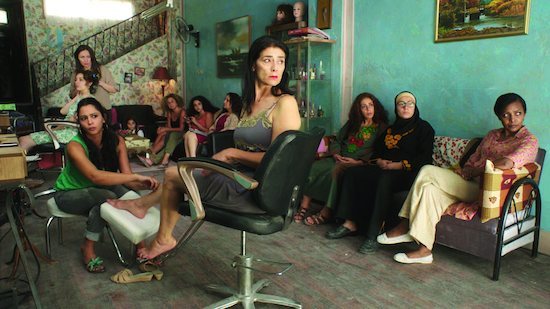When I watch a film like Dégradé, I'm glad that I'm not a critic.
The way I see it, a film critic will look at a cinematic work of art as just that, a piece by the artist -- artists in the case of brothers-filmmakers duo Tarzan and Arab -- to evaluate and regurgitate chock-full of his or her own insight and opinions. Someone like me instead gets to sit through a film and enjoy it, feel its atmosphere, infuse it with yes, my own insight and thoughts, but never looking for a way to appraise it outside of how it made me feel.
I'm also lucky that I often get to know the filmmakers behind the work, the crew of a particular film, and in the case of Dégradé, I won't shy away from saying that I found in both the Nasser brothers, their actress Maisa Abd Elhadi and their producer Rashid Abdelhamid a group of classy people, with a great collective sense of humor to boot. Does that sway my opinion? You betcha. But that's what being human and admiring humanity for our collage of variegated backgrounds is all about, isn't it.
The setting of Dégradé, it is more about setting than a linear story here, is a beauty salon in Gaza, where women from all walks of life and religions, and at different stages of maturity come together. It's an idea that's been used before, in Hollywood and beyond, but it is truly the best way to display a cast of powerhouse leading ladies like Hiam Abbass, Huda Al Imam and the young, yet wondrous already Maisa Abd Elhadi. It is also a setting that lends itself best to describing the day-to-day challenges of living in a war zone, particularly for the women, who aren't called to arms. Living aggression in a passive way can feel like an emotional roller coaster.
Humanitarian activist Zainab Salbi once came across a woman who asked her for lipstick, in the midst of the Bosnian War, and when Salbi asked her why, her answer blew her away. Lipstick, in desperate times for women, can become itself an act of resistance. I know in my own darkest moments, bright red is always in order.
When Charles Tesson, Artistic Director of La Semaine de la Critique introduced Dégradé last year at the Festival de Cannes (where the film world premiered), he said that it was wonderful to find again, the "irreverence and humour that had been missing in Arab cinema," since the death of Egyptian auteur Youssef Chahine. While those of us who watch enough Nadine Labaki and Elia Suleiman to know better gasped in the audience, in retrospect Tesson did have a point. The Nasser brothers have managed to create a whole new world within the salon in Gaza where Dégradé takes place. Their film is full of inside jokes, but also of insight into a Palestinian society we seldom see, where getting a haircut is as important, if not more, than national politics. The brothers have also purposely left out politics, and allegorised this choice by keeping both the stolen lioness -- you'll have to watch the film to know what I mean -- and the soldiers and bullets outside of the beauty salon.
But a favorite part of any film, anywhere, is when I discover a finger-pointing message of sorts towards the filmmaker's motherland. Italians pointed the finger at a post-war disintegrating Italy through their Neorealism filmmakers, while the new wave of Indian cinema, the country's most exciting trend, points the finger at India's corruption and disrespect of women. In Dégradé, Tarzan and Arab do a great job at showing us what's wrong with Palestinian politics and just how complacent the society around it has gotten in accepting this truth.
It's a bittersweet message, but it does make Dégradé a film worth watching and accepting, in all its shades of truths, imperfections and all.
I recently had a chance to spend some time with Tarzan Nasser, Dégradé producer Rashid Abdelhamid and the film's co-star Maisa And Elhadi at the Middle East Now festival in Florence, a great event where all cultures from the entire region come together. We shot some 'Selfies Interviews' together, sprinkled throughout the piece here, where the trio shared stories about the first film they ever remember watching, their favorite meal and three words that describe them.
These are precious insight as Dégradé begins to open to cinema audiences this week, beginning in France, then moving onto The Netherlands in May.
Top photo courtesy of Middle East Now, used with permission.

